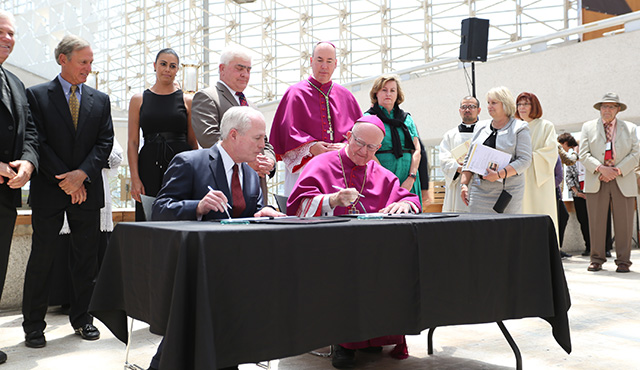“The LORD will open the heavens, the storehouse of his bounty, to send rain on your land in season and to bless all the work of your hands.” Deuteronomy 28:12
The Orange Catholic Foundation has been blessed to serve the Diocese of Orange, its parishes and schools, by currently managing 67 funds totaling more than $44 million. But this huge task carries great responsibility.
“At OCF, we understand that the deeply held values of our Catholic faith go hand-in-hand with our investment strategies,” said Cindy Bobruk, OCF president and executive director. “Catholic investors expect it and our mission reflects it: we raise, manage, grow and grant funds that support Catholic values and each donor’s intent.”
From parish and school endowment funds to Christ Cathedral campaign donations, OCF manages and grows funds with the assistance of Christian Brothers Investment Services (CBIS), a Catholic socially responsible asset management firm founded in 1981 by the De La Salle Christian Brothers. CBIS manages $7 billion in assets globally, with clients that include Catholic dioceses, colleges and universities, religious institutes and health care systems.
CBIS employs investment strategies that screen companies in three main categories: human dignity (i.e., abortion, human trafficking, pornography, child exploitation); economic justice (i.e., worker rights, responsible banking, health access); and environmental stewardship.
“If you believe in the teachings of the church, you want to make sure that your investments align with the right companies,” said Ric Brutocao, a parishioner at St. Timothy Catholic Church in Laguna Hills and a member of the Christ Cathedral Campaign Task Force. “Your biggest advantage as a Catholic investor is allowing your voice to be heard on issues that matter to you like poverty, which Pope Francis highlighted during the Year of Mercy.”
Julie Tanner, director of CBIS Catholic Responsible Investing, oversees the implementation of the screening program that ensures that no OCF investments are in companies that violate Catholic teaching. Along with the screening, CBIS seeks to engage companies to make a change in corporate policies and industries as a whole through engagement with corporate management, shareholder resolutions or proxy voting.
For example, CBIS along with other faith-based coalitions might approach a large corporation who is not aware that its suppliers engage in child labor or indentured servitude. With information presented by CBIS and coalition members, these active investors might affect great change by asking the large corporation to demand action from suppliers.
“I have seen an incredible amount of change because of our intervention and our work with companies, and Catholic institutions have been the leaders in this work,” said Tanner. “Catholic investors are more aware of the power of active ownership that might change corporate policy or even an industry. And I think companies have a greater awareness of their role and what they need to do to protect shareholders from risk and to protect people’s human rights and human dignity.”
Catholic investors also expect highly competitive returns on their investment, something OCF believes Catholic investors need not compromise on when screening companies that might violate Catholic teaching.
“What we’ve seen in our Catholic-responsible investing is that returns are very competitive,” said Fernando Jimenez, treasurer of the OCF Board of Directors.
“OCF believes we can do well by doing good,” said Hank Evers, OCF director of Development and Communications.
Invest Like a Catholic
Catholics are aware of socially responsible investing (SRI), but OCF’s investment strategy goes further by aligning itself specifically with Catholic moral teachings and values, as outlined by the United States Conference of Catholic Bishops. The USCCB states in its Socially Responsible Investment Guidelines (from Economic Justice for All) that:
“Individual Christians who are shareholders and those responsible within church institutions that own stocks in U.S. corporations must see to it that the invested funds are used responsibly. Although it is a moral and legal fiduciary responsibility of the trustees to ensure an adequate return on investment for the support of the work of the church, their stewardship embraces broader moral concerns. As part owners, they must cooperate in shaping the policies of those companies through dialogue with management, through votes at corporate meetings, through the introduction of resolutions and through participation in investment decisions.

